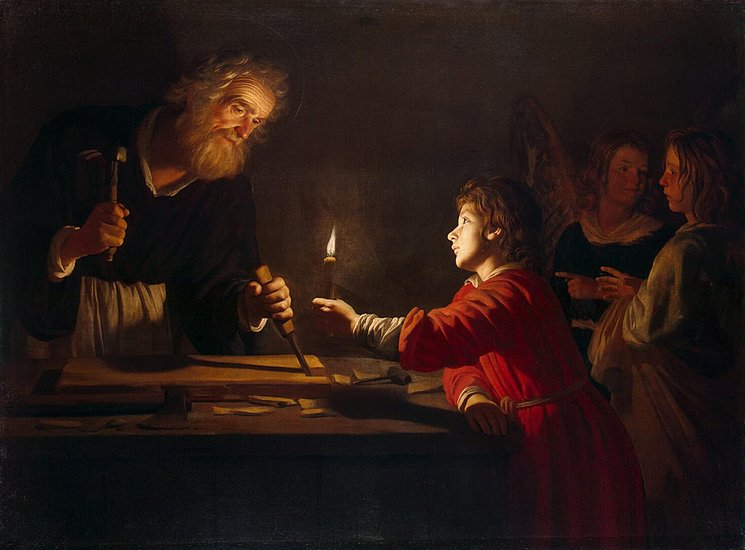Does This Act Make Me Look Righteous?
Matthew 1:18-25
Fourth Sunday of Advent
Analysis by Timothy Hoyer
18 Now the birth of Jesus the Messiah took place in this way. When his mother Mary had been engaged to Joseph, but before they lived together, she was found to be with child from the Holy Spirit. 19 Her husband Joseph, being a righteous man and unwilling to expose her to public disgrace, planned to dismiss her quietly. 20 But just when he had resolved to do this, an angel of the Lord appeared to him in a dream and said, “Joseph, son of David, do not be afraid to take Mary as your wife, for the child conceived in her is from the Holy Spirit. 21 She will bear a son, and you are to name him Jesus, for he will save his people from their sins.” 22 All this took place to fulfill what had been spoken by the Lord through the prophet: 23 “Look, the virgin shall conceive and bear a son, and they shall name him Emmanuel,” which means, “God is with us.” 24 When Joseph awoke from sleep, he did as the angel of the Lord commanded him; he took her as his wife, 25 but had no marital relations with her until she had borne a son; and he named him Jesus.
DIAGNOSIS: Looking Good!
Step 1: Initial Diagnosis (External Problem): We Want A Good Reputation
Joseph was a righteous man. Ooh, don’t we all wish we were righteous—someone who was known to do the right thing, to do the right thing well, to be right, to have wise opinions, and to be regarded as really good in one’s job and in doing the loving things for one’s family. When we are righteous, however, we notice those who are not, and do not want them to make our reputation a bad one. When Mary got pregnant and Joseph knew he did not get her pregnant, everyone else would at first think Joseph got her pregnant, and that was not a righteous thing to do. If they found out someone else got the engaged Mary pregnant, not only would Mary be publicly disgraced (lose her reputation as a righteous person), Joseph’s reputation would also get blemished. And really, dismissing Mary quietly? That would save her from public disgrace? She would still be pregnant. And everyone would find out she was no longer engaged to Joseph. They would figure out the reason why she was no longer engaged. Joseph could not save her from public disgrace.
Step 2: Advanced Diagnosis (Internal Problem): We Trust Our Actions to Earn Us a Good Reputation
This righteousness of Joseph that we all want is a righteousness based on what we do. Righteousness is based on acting according to the majority’s standards. We call it morality, values, good behavior, good manners. It’s having a good work ethic. It’s having good family values. It’s being patriotic. Not only is righteousness good behavior according to some standard, righteousness is our god. We trust in our righteousness. The promise is, “Do the right things, and you will be righteous and seen as righteous by others and by God.” We trust that promise. We live by that promise. Even when we go out with friends for a fun night, having that fun is what we trust is what makes us and our life good. It makes us righteous. That is our belief. Righteousness is the god we serve.
Step 3: Final Diagnosis (Eternal Problem): Our Act of Trust in Our Own Righteousness Makes Us Unrighteous
To serve righteousness as our god is to serve the creature instead of the Creator. It is to make ourselves the ones who know what is good and evil, what is right and wrong. We know, not God. We have put ourselves in the place of God. That is always our sin, the sin that in the system of earning one’s righteousness by what one does always rewards us with death.
PROGNOSIS: All Is Not Lost
 Step 4: Initial Prognosis (Eternal Solution): Jesus Is the New Righteousness
Step 4: Initial Prognosis (Eternal Solution): Jesus Is the New Righteousness
Joseph was told by God’s messenger that the child was from God, not from another human, and that Joseph was to name the child Jesus, “for he will save his people from their sins.” Jesus was to save people from failing to be righteous. Jesus was to save people from putting themselves in God’s place. Jesus was to save people from their death that results from their sin. Jesus’ act of saving was not a heroic deed, not some bold act done by a person with super powers. His saving act did not look righteous at all. He died on a cross—a very unrighteous death. It was a death of shame and scorn and humiliation. There is nothing in Jesus’ death that we can be proud of or boast of. Jesus’ death goes against all standards of righteousness. Yet God raised Jesus from death! Death is overcome. And when death is overcome, so is the way of righteousness; and the way of rewarding good deeds with the status of righteousness and punishing bad deeds with disgrace is now abolished.
Step 5: Advanced Prognosis (Internal Solution): We Trust Jesus to Be Our Righteousness (Jesus Makes Us Good)
Jesus’ saving act has nothing we can take pride in so that all of our being saved by Jesus depends on our trust in his promising us to forgive us and give us eternal life. Jesus forgiving us is our righteousness. Forgiveness is Jesus giving us his death and rising as our own. So our righteousness is Jesus on a cross, which is very different than all the good and wonderful actions the first way of righteousness demands.
Step 6: Final Prognosis (External Solution): With Jesus’ Righteousness, We Get To Make Others Righteous
Since our righteousness is found in being like Jesus crucified and risen, we don’t have to keep our distance from people who are not so righteous, but, like Jesus, we can be friends with sinners, the unrighteous. We can act with Jesus’ love toward those who are disgraced. We welcome the scorned, give strength to the weak, aid to the poor, respect to those who are different than we are. We do not worry about how we look. We do not worry about our righteousness. We are confident that we are righteous to God because of Jesus.





You must be logged in to post a comment.